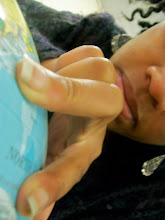Socorro Reyes Quintana, abuelita de Mina Jophrey-Reyes
Siempre le llamarón "La Reina". Socorro drew attention to herself like the sunrise, like the moonrise when it's full and gold and large in the sky, like an ambulance siren passing buy. Your eyes were always drawn to her and your ears would wait for the music of her voice. Her laughter fell like multi-colored jewels from her lips and her stories were gentle pearls to guide you but never told you what to do. always had a double-meaning.
People came to Socorro because she was a wise woman. Her garden flowered with the seasons. She dried the herbs and sold them in town for medicina. was always plentiful. She watched the night skies with her homemade telescopes and spend rainy afternoons during the aguaceros in her library reading. The women came to Socorro to learn what their husbands would not permit them to learn. The men came to Socorro for what they were ashamed they didn't know. The children came to Socorro for her famous and sweet agua de jamaica and to play on her garden swing. Everyone loved and respected Socorro.
Socorro loved her pueblito with its little church on the sea. Their ancestors had come with companions and slaves of Columbus – humble, strong, and intelligent people who knew how to survive. She also knew they had the help of los Santos.
She knew this because her abuela had told her. And her abuela’s abuela told her, and her abuela’s abuela had told her. And each generation of woman told her daughter to always remember.
After her daily visits with her neighbors, she would settle down meditate to listen Los Tres Panchos and dance with the portrait of her husband for one song. Don Pedro had died in a fishing accident during Hurricane Hugo in 1992. They had been married for 27 years and had two daughters and a son: Maria Teresa (Maite), Dayanara Arely (Dayar) y Juan Carlos (Juca).
Socorro had not gone to la Universidad, but had worked for an astronomy professor there. She also had worked in the libraries and ate as many books as she could. Her eyes were always keen to the skies and she watched as they changed over the year.
On one evening in October, two weeks before the end of hurricane season, Socorro was walking barefoot in her garden. The flamboyan flowers were a pale yellow in the moonlight.
Just beyond the boughs of the trees she saw a streak of green paint the sky. The coquis fell silent. All she heard was the sound of the ocean’s muffled waves in the distance. Not even a radio or rustle of wind in the leaves. The stillness unsettled her and stood her arm hairs on end, so she crossed herself, put on her wistful face ,and remembered when she discovered Orion for the first time. There were three stars in his belt, one for each king.
“¡Socorro!” came an excited whisper from the side fence. “¡Socorro! Something terrible has happened! A ship has sunk off Culebra!”
Socorro had heard her neighbors speak of their children working for the American military. They were proud of the good jobs and the money they left in the village every weekend. Still, somehow she didn’t trust all the secrecy surrounding the base on Culebra.
“¿Que dices, Carmen? Come in. Sit and tell me what you’ve heard.”
Carmen told Socorro of large military ship in the bioluminescent bay. Something. A rocket? A comet? A torpedo? Had struck the head of the ship and it sank. Most of the sailors had abandoned ship and were saved, but the ship burned with a strange green fire and shot off flares. It burned to the depths of the sea, an eerie green like a ghost being trapped down in hell.
“Dios mio” whispered Socorro under her breath. She held her locket thoughtlessly in her fingers, rubbing the etching of Atabey.
“Take me to the boat launch, Carmen. I want to see for myself.”
Socorro locked the front door, looked at the portrait of her husband, locked the back door, and then stepped into the passenger side of Carmen’s pale blue 1970 Chevy Camino.
Friday, February 12, 2010
Subscribe to:
Comments (Atom)

